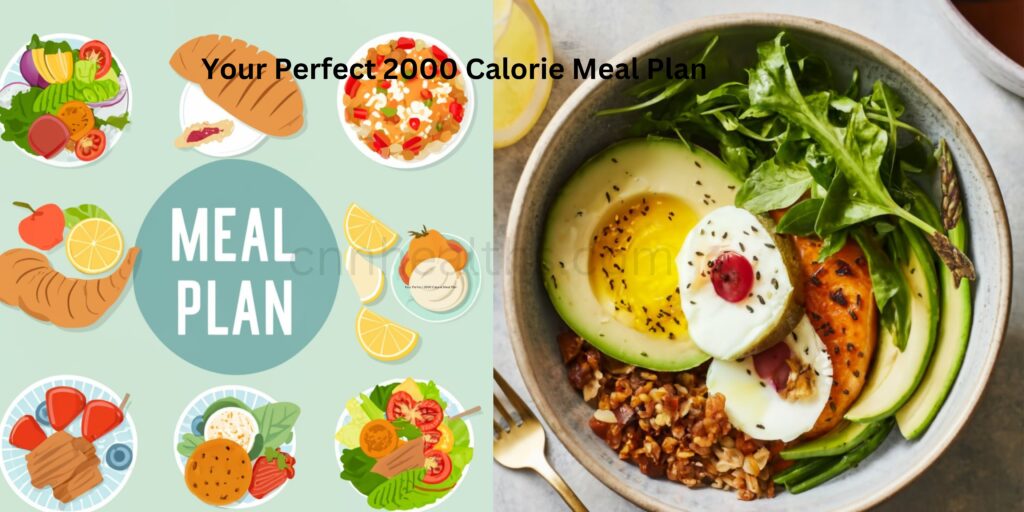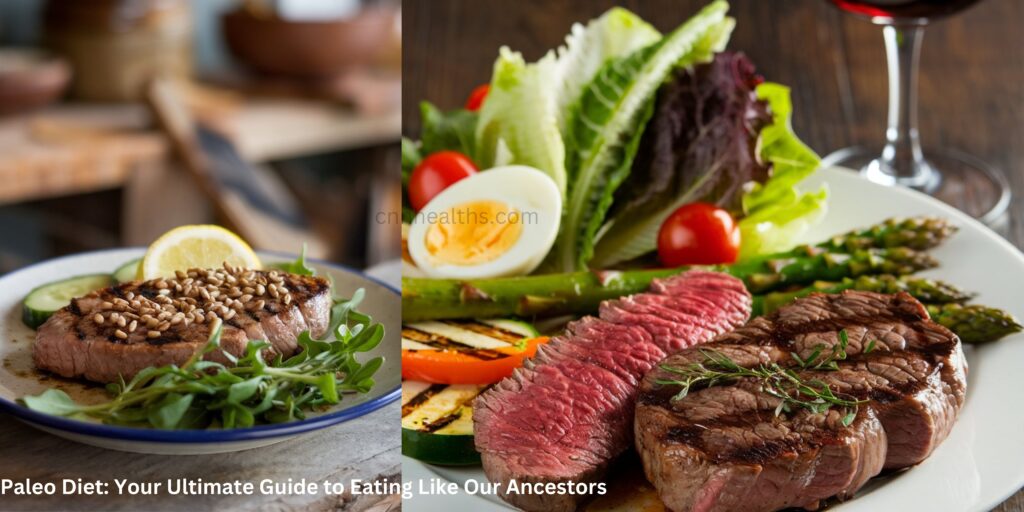Intro
This article is all about “Your Perfect 2000 Calorie Meal Plan”. Embarking on a journey to better health can feel overwhelming, especially with all the conflicting dietary advice out there. However, a structured approach can significantly simplify the process. A well-balanced 2000 calorie meal plan is a fantastic way to ensure you’re consuming the nutrients your body needs while maintaining an appropriate caloric intake. In this blog post, we will explore various aspects of creating your perfect meal plan, covering everything from the fundamentals of calorie counting to delicious meal ideas that keep you satisfied and energized throughout the day.

Understanding the Basics of a 2000 Calorie Meal Plan
A 2000 calorie meal plan revolves around a balanced mix of macronutrients—carbohydrates, proteins, and fats—spread across your daily meals. This calorie level suits many grown person providing enough energy to fuel daily activities while supporting overall health. A typical breakdown might include 50-60% of calories from carbohydrates, 15-20% from proteins, and 20-35% from fats. However, individual needs can vary based on factors like age and activity level. By focusing on nutrient-dense foods like whole grains, lean proteins, healthy fats, and plenty of fruits and vegetables, you can create a meal plan that not only meets your caloric needs but also supports your health goals. Understanding these basics helps you make informed food choices, ensuring each meal is both nutritious and satisfying.
Setting Realistic and Personal Health Goals
Setting realistic and personal health goals is a cornerstone of any successful meal plan. Begin by identifying what you want to achieve—whether it’s shedding a few pounds, building muscle, boosting energy levels, or simply embracing a healthier lifestyle. Tailoring your 2000 calorie meal plan to align with these specific objectives will make your journey more meaningful and effective. For instance, if your goal is weight loss, focus on achieving a slight caloric deficit while still ensuring that your meals are rich in essential nutrients. On the other hand, if muscle gain is your target, you might want to emphasize protein-rich foods to support muscle repair and growth. Always remember that your goals should be SMART: Specific, Measurable, Achievable, Relevant, and Time-bound. This framework will help you stay focused and motivated, allowing you to track your progress with clarity. It’s also important to consider your lifestyle and preferences when setting your goals. If you lead a busy life, incorporating quick and easy meal options into your plan will help you stay consistent. Listen to your body and be flexible—it’s okay to make adjustments as needed. With realistic and personalized health goals, you’ll be well on your way to making lasting and positive changes in your life.
Essential Macronutrients for a Balanced Diet
A balanced 2000 calorie meal plan hinges on the proper distribution of macronutrients to fuel your body efficiently. Carbohydrates should make up about 50-60% of your daily intake, serving as the primary energy source for your brain and muscles. Aim to choose complex carbs like whole grains, legumes, and vegetables to keep your energy levels steady throughout the day. Proteins, comprising 15-20% of your daily calories, are crucial for muscle repair and growth. Opt for lean protein sources such as chicken, fish, tofu, and legumes to ensure you’re getting high-quality nutrients without excess fats. Speaking of fats, they should account for 20-35% of your daily calories Healthy fats are extremely important for (chemical produced by the body) production and something that acts as food (picking up of a liquid). Incorporate sources like avocados, nuts, seeds, and olive oil to provide these vital nutrients while keeping your heart happy. Incorporating a variety of foods rich in these macronutrients ensures you’re not only meeting your caloric needs but also supporting overall health. Focus on nutrient-dense options to get the most bang for your buck. Remember, the quality of your food choices plays a pivotal role in how you feel and function. By balancing your intake of carbohydrates, proteins, and fats, you can create a satisfying and nutritious 2000 calorie meal plan tailored to your lifestyle and health goals.
Crafting Delicious and Nutritious Breakfasts
Breakfast sets the tone for your entire day, so why not make it as delightful and nutritious as possible? Start your morning with a bowl of creamy oatmeal garnished with fresh berries and a sprinkle of nuts, offering a balanced mix of complex carbs, fiber, and healthy fats. If you’re in the mood for something savory, a veggie-packed omelet paired with whole-grain toast can provide a protein boost to keep you energized. Greek yogurt is another fantastic option; top it with granola and a drizzle of honey for a quick, protein-rich meal that’s equally satisfying. Each of these breakfast ideas can be customized to fit your preferences, ensuring you get a flavorful start that aligns perfectly with your 2000 calorie meal plan.
Wholesome and Satisfying Lunch Options
When lunchtime rolls around, it’s crucial to opt for meals that are both nourishing and delightful. Think about dishes that are easy to whip up yet loaded with nutrients. For instance, a colorful salad brimming with mixed greens, grilled chicken, quinoa, and a medley of veggies can be incredibly refreshing and filling. Whole-grain wraps filled with lean turkey, avocado, and crunchy veggies offer a balanced, portable option perfect for a busy day. If you crave something warm, consider a hearty vegetable soup paired with a whole-grain roll—comforting and nutrient-dense. Additionally, experimenting with flavors and textures can make your lunch more enjoyable. Try a zesty chickpea and avocado salad or a bowl of brown rice topped with stir-fried tofu and vibrant vegetables. Incorporating a variety of ingredients not only keeps your meals exciting but also ensures a broad spectrum of nutrients. Don’t shy away from incorporating healthy fats like those found in olive oil or avocados, as they can enhance both the flavor and nutritional profile of your meal. Preparing your lunches ahead of time can also be a game-changer, making it easier to stick to your 2000 calorie meal plan without sacrificing flavor or nutrition.
Planning Dinner That Hits the Right Nutritional Notes
Dinner is often the most anticipated meal of the day, offering a chance to unwind and enjoy a delicious, nutritious dish. To keep things balanced and satisfying, consider options that are rich in flavor and nutrients. Baked salmon served with a side of steamed broccoli and quinoa is a fantastic choice, delivering a good mix of healthy fats, lean protein, and complex carbohydrates. If you’re in the mood for a plant-based meal, try stir-fried tofu with an assortment of colorful vegetables or a hearty lentil stew paired with whole-grain bread. Whole-grain pasta dishes can also be a dinner-time delight. Think of a pasta tossed with a robust tomato sauce, lean ground turkey, and plenty of fresh basil and spinach. This combination not only satisfies your taste buds but also aligns perfectly with your 2000 calorie meal plan. Don’t wait to get (showing the ability to create interesting new things) with herbs and spices.They can elevate your meals, adding depth and richness without extra calories. A sprinkle of rosemary on your roasted chicken or a dash of turmeric in your vegetable curry can make all the difference. Balancing your dinner plate with a variety of macronutrients will keep you feeling full and nourished, rounding out your day on a high note.
Healthy Snacks to Keep You Energized
Healthy snacks are an integral part of a 2000 calorie meal plan, providing that extra boost to keep you going throughout the day. Opt for nutrient-dense snacks that balance protein, healthy fats, and fiber. For instance, a handful of almonds not only offers healthy fats and protein but also keeps you satiated. Carrot sticks paired with hummus make for a crunchy and satisfying option rich in vitamins and minerals. If you have a sweet tooth, apple slices with a dollop of peanut butter can be a delightful treat, combining the fiber of the fruit with the protein and healthy fats from the peanut butter. Greek yogurt with a sprinkle of granola or a few berries can be a protein-packed snack that’s both delicious and filling. For a savory alternative, consider whole-grain crackers topped with avocado or a small portion of cottage cheese mixed with fresh pineapple chunks. These snacks not only align with your 2000 calorie meal plan but also add variety to your daily intake, making it easier to stay on track. The key is to choose snacks that complement your meals, keeping your energy levels stable and your cravings in check.
Beverage Choices to Complement Your Meal Plan
Staying hydrated is crucial, and your beverage choices play a significant role in complementing your 2000 calorie meal plan. Water should always be your primary beverage—it’s calorie-free, refreshing, and essential for all bodily functions. But variety can make hydration more enjoyable. Unsweetened herbal teas offer a flavorful alternative without added sugars or calories. Green tea, in particular, is packed with antioxidants that can boost your overall health. Black coffee is another excellent option, providing a morning or midday pick-me-up with minimal calories. Just be mindful of added sugars and creams that can sneak in extra calories. If you’re a smoothie enthusiast, create nutrient-dense blends using whole fruits, vegetables, and a protein source like Greek yogurt or a scoop of protein powder. This way, you can control the ingredients and avoid hidden sugars found in store-bought versions. For a bit of zest, infuse your water with slices of lemon, cucumber, or fresh berries. These natural flavorings can make drinking water more enjoyable without adding calories. Avoid sugary drinks like sodas and high-calorie juices, as they can derail your meal plan by providing empty calories. By making thoughtful beverage choices, you can stay hydrated and ensure your 2000 calorie meal plan remains balanced and effective.
Tips for Meal Prep and Staying Consistent
Planning and preparing meals in advance can be your secret weapon for sticking to a 2000 calorie meal plan. Start by setting aside a specific time each week dedicated to meal prep. This could be a weekend afternoon or any time that fits your schedule. Begin by creating a meal plan for the week, including breakfast, lunch, dinner, and snacks. Make a described/explained shopping list to secure/make sure of you have all the necessary ingredients. Batch cooking is a game-changer—consider preparing large portions of grains, proteins, and vegetables that you can mix and match throughout the week. Store these in airtight containers to keep them fresh and easily accessible. Pre-portioning snacks like nuts, fruits, or veggie sticks can also make a big difference, offering you healthy options that are ready to grab and go. Another tip is to use versatile recipes that can be adapted based on what you have on hand. This flexibility can help prevent meal fatigue and keep things interesting. Additionally, having a few go-to quick recipes can save the day when you’re short on time or energy. Staying organized is crucial. Use labels and keep an inventory of what you have in your fridge and pantry. This way, you’ll always know what you have available, reducing food waste and helping you stay consistent with your 2000 calorie meal plan.
Tracking Progress and Making Adjustments
Tracking your progress is a crucial aspect of maintaining an effective 2000 calorie meal plan. Use a food journal or a mobile app to log your daily meals, snacks, and even beverages. This not only helps you stay accountable but also allows you to see patterns in your eating habits. Pay attention to how your body feels—notice any changes in energy levels, mood, or physical performance. Regularly reviewing your logs can help you identify what’s working and what might need tweaking. For example, if you find that you’re still hungry after meals, you might need to incorporate more fiber or protein. Conversely, if you’re feeling overly full or sluggish, reassess your portion sizes or the types of foods you’re consuming. Remember, flexibility is key. Life happens, and sometimes you’ll need to adjust your plan to fit your circumstances. The goal is to find a sustainable balance that aligns with your health objectives. Celebrate your successes and learn from any setbacks. By continually refining your 2000 calorie meal plan, you’ll be better equipped to achieve and maintain your health goals.

